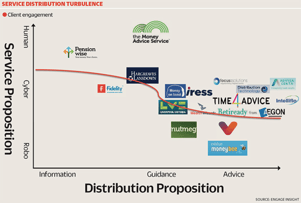According to the 'Big 4' consultancies, 2017 is the year of #RegTech. Well, we all know the client journey is changing rapidly. With the rise of #FinTech and its low cost of entry, it represents a great opportunity for the new wave of automated investment solutions and service propositions that are now arriving in abundance. You only have to look at E-Vestor, Advicefront and Wealth wizards to see the financial advice and planning proposition has already changed by using technology as an enabler and engagement tool for clients to enjoy a ‘joined up approach’ to meet their on-going needs.
Having just launched our new FinTech/RegTech platform #Model Office - MO, we also see the rising importance for RegTech in applying technology to the client journey. By definition, RegTech develops understanding of engagement between retail advice firms and the FCA to ensure service propositions are aligned within the regulatory and risk management frameworks.
As we now face (what we call) considerable ‘distribution turbulence’ in service propositions firms are designing and offering, we would argue that all advice firms big or small now need to design a client framework that takes into account the benefits of both FinTech and RegTech.
As our research shows and as illustrated in the diagram, client engagement is now moving  towards a ‘cyber’ service proposition, one that integrates technologies and provides clear information, guidance and/or advice that helps them make informed decisions about current and future needs. Clients tell us they want two principle issues covered via technology:
towards a ‘cyber’ service proposition, one that integrates technologies and provides clear information, guidance and/or advice that helps them make informed decisions about current and future needs. Clients tell us they want two principle issues covered via technology:
1. Answer the ‘What’s in it for me Question’: For example by proving cash flow modelling based on their current and future needs and integrating risk profiling via attitude to risk technology, clients essentially want to know if they are going to be OK.
2. Value for money: Ensuring a service that is tailored to their needs and is easy to access and understand is crucial
When it comes to the client's experience there are a number of issues where technology can make a difference:
1. Social media: Allows the firm to mine client engagement data and the clients to receive timely and informative messages on the service proposition
2. On demand: Clients should be able to join in on their service experience whenever they wish
3. Online/Offline: As mentioned a joined up approach is now demanded which brings together online and offline services
4. DIY: Clients who wish to self-invest alone
As I wrote in my last MM article we believe that Artificial Intelligence is the next game-changer and this will begin to arrive in 2018 onwards thus by 2020, firms would be in a position to offer genuine cyber-advice propositions where clients are able to engage 100% digitally until they decide they want to ‘phone a friend’ and press the ‘click to call’ button to speak to a qualified professional The good news is investors tell us they do value the human touch especially when they have big life event decisions to make such as tax planning, house purchase, education planning for example.
So where does RegTech sit? Well our digital diagnostic platform Model Office, benchmarks good professional practice, which incorporates the FCA COBs suitability directives maps, associated final guidance and discussion papers. This means firms are able to assess where they sit against their peers and also against the rulebook.
What RegTech will ensure is that firms are incorporating a ‘balanced scorecard’ across their business, ensuring a holistic approach is taken to integrating technology into their service and investment propositions. This means firms can stress test new service design against the rules and their client needs. They receive detailed MI and risk reporting, they can ensure compliance data and market trends are assessed and recorded and comply with all fraud prevention requirements. Finally, but not least, firms can calibrate their ‘cyber services’ against the rulebooks and ensure that they are suitable (RDR) and appropriate (MiFID 2).
Essentially RegTech can assess and manage all conduct risk metrics across client engagement and the suitability rules and FinTech makes it all look simple, easy and highly engaging if designed around the digital client experience.
Please click the below icon link to the 'Lite' (free) platform and learn more about MO today..

